Key takeaways:
- Understanding your rights within the healthcare system empowers disabled individuals to advocate for themselves and seek necessary care.
- Selecting healthcare providers who genuinely listen and respect a patient’s experience can significantly improve treatment outcomes.
- Building a support network and utilizing resources such as local organizations and online platforms can enhance the healthcare navigation experience.
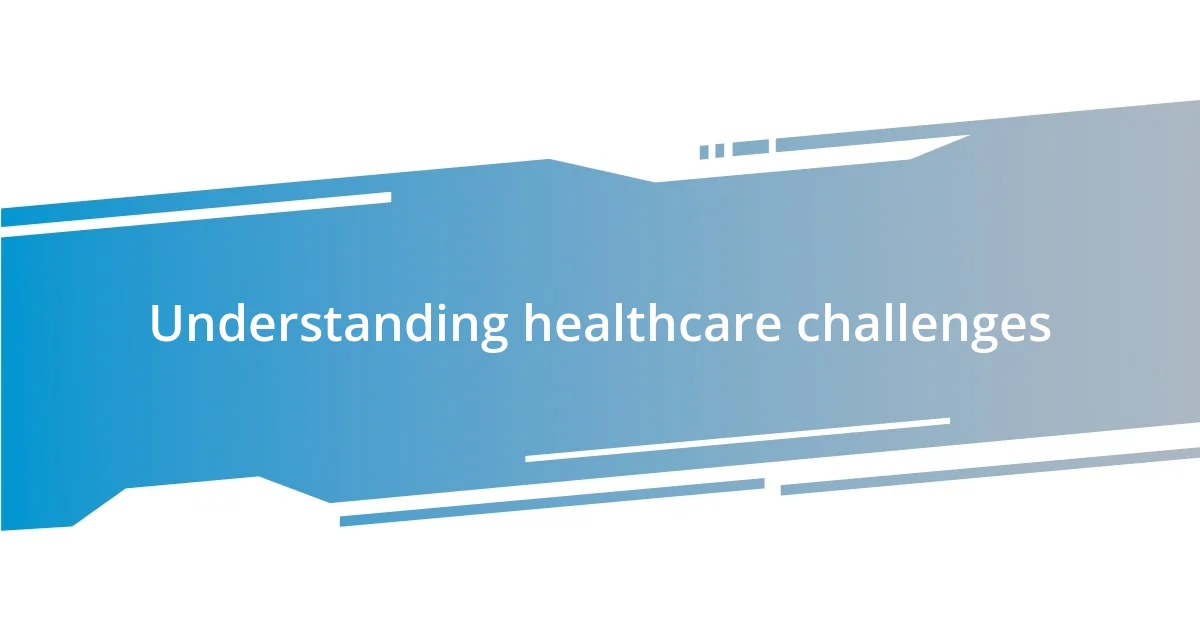
Understanding healthcare challenges
Navigating healthcare as a disabled person can sometimes feel like you’re swimming against a strong current. In my own experience, I’ve often faced medical professionals who didn’t fully understand my condition, leaving me to advocate for myself at every turn. I still remember one time in the waiting room, feeling invisible while health professionals discussed my treatment without involving me—how frustrating that can be!
The complexity of navigating various insurance plans is another hurdle. I once found myself buried under piles of paperwork, trying to decipher what was covered and what wasn’t. This struggle is not just annoying; it can be emotionally exhausting as well, leading me to wonder: Why is this process so intricate when the goal is to provide care?
Accessing the appropriate equipment or therapy can also be daunting. There was a period when I desperately needed new mobility aids, but insurance coverage was a continual roadblock. I can’t help but feel that if barriers were lowered, it would open a doorway to independence for so many of us. Wouldn’t you agree that simpler, clearer processes could make a world of difference?
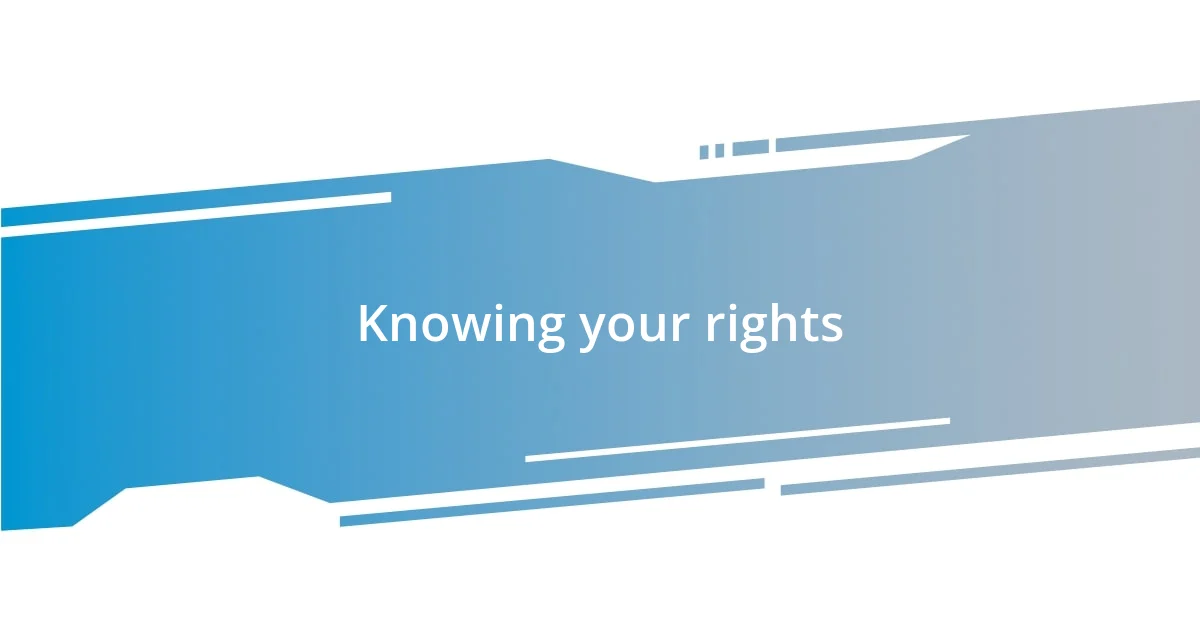
Knowing your rights
Understanding your rights within the healthcare system is crucial for disabled individuals. I vividly remember a time when I was denied a specific treatment because the provider claimed it wasn’t “standard procedure.” It felt like my voice was being silenced, but I knew I had the right to challenge that decision. This awareness empowered me to seek support from an advocate, which ultimately led to me receiving the care I needed.
Here are some key rights to keep in mind:
- Right to Accessible Care: You have the right to accessible facilities and services, including transportation and physical access to healthcare locations.
- Right to Information: You should receive clear information about your care options in a format that accommodates your needs.
- Right to Privacy: Your medical information is confidential, and you have the right to control who accesses it.
- Right to Participate in Your Care: You have the right to be involved in decisions regarding your treatment plan and to voice your preferences.
- Right to Non-Discrimination: Healthcare providers cannot discriminate against you based on your disability; they are required to treat you equitably.
Being well-informed about these rights allows for better advocacy. Knowing how to assert them can turn a frustrating experience into one where you feel seen and heard.
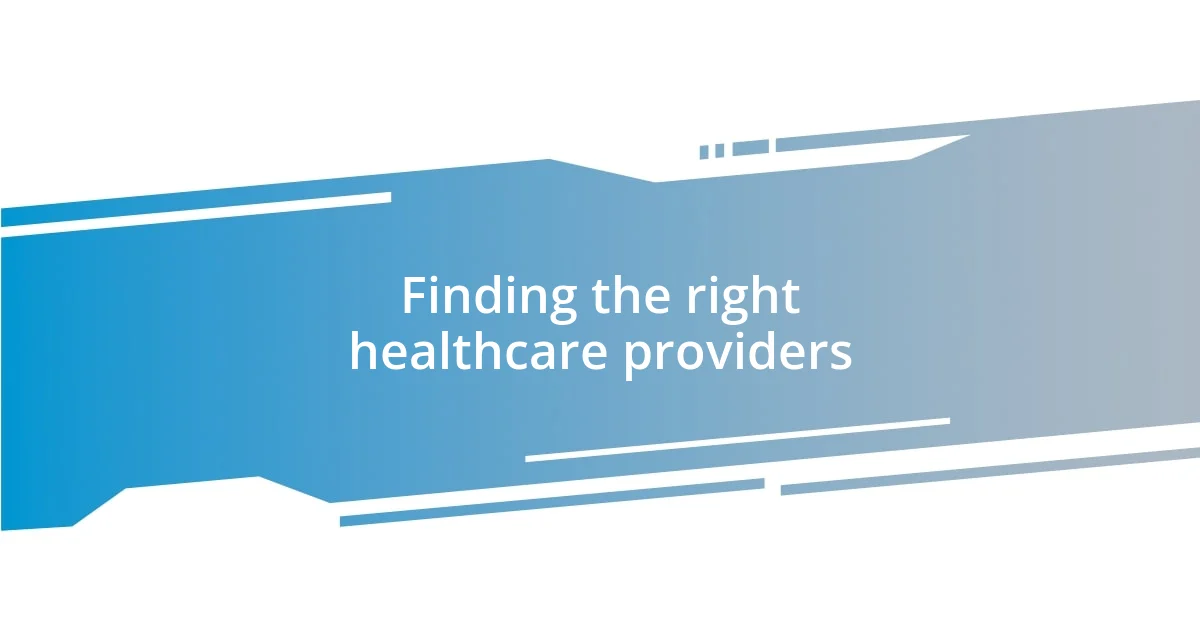
Finding the right healthcare providers
Finding the right healthcare providers can often be a challenging endeavor for those of us with disabilities. My journey started with trial and error, meeting various specialists who either dismissed my concerns or didn’t have the expertise necessary to manage my unique needs. I remember feeling a mix of anxiety and hope with every new appointment, wondering if I would finally find someone who truly cared.
One vital strategy that has worked for me is to seek providers who not only specialize in my condition but who also demonstrate a genuine understanding and respect for my experience. During one particularly enlightening visit, I met a doctor who not only listened but actively involved me in the decision-making process. This shift in dynamics made such a difference, reinforcing my belief that the right provider acknowledges your autonomy and validates your feelings. Have you ever felt the relief that comes with being understood? It’s transformative.
It’s also essential to evaluate the logistics, such as office accessibility and staff responsiveness. After one visit to a facility that was not wheelchair-accessible, I learned the hard way that it was worth researching ahead of time. I often utilize community resources and online forums to find recommendations, allowing me to connect with other individuals who share similar experiences. Knowing that I have support makes navigating this journey a little less daunting.
| Provider Characteristics | Importance |
|---|---|
| Experience with your specific disability | Ensures tailored care and understanding |
| Effective communication style | Facilitates a collaborative approach to treatment |
| Accessibility of facilities | Ensures ease of access for appointments |
| Positive patient reviews | Provides insight into the provider’s approach and care |
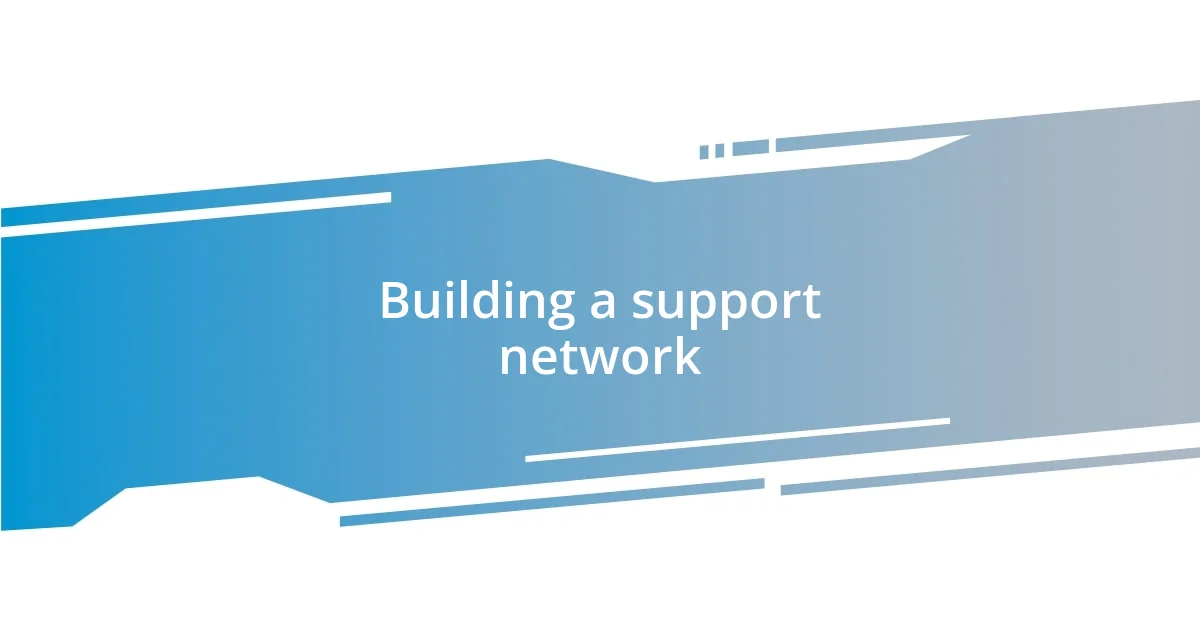
Building a support network
Building a support network is an invaluable asset for navigating healthcare as a disabled person. When I started connecting with others who understood the unique challenges we face, I felt a sense of belonging and strength. One evening, after attending a local support group, I walked away not only with new friendships but also with practical tips from others who had successfully navigated similar experiences. Isn’t it amazing how shared stories can light the way through dark times?
One pivotal moment for me came when a peer shared their struggle with insurance claims. It struck a chord; I realized I wasn’t alone in feeling overwhelmed by the bureaucratic side of healthcare. Their guidance on how to advocate for myself—and the importance of involving family or friends in these conversations—was a game-changer. I began to involve my partner in discussions with providers, making it easier to express my needs and concerns.
On top of connecting with individuals, I also found that online communities can be incredibly supportive. Through social media groups and forums, I’ve discovered countless resources, recommendations, and emotional support from people who get it. Have you ever felt hesitant to share your story online, worried about how it might be received? I can relate; it can be daunting. But creating or joining a supportive network and voicing our experiences can significantly enhance our ability to navigate the healthcare maze together. Each shared victory fosters resilience and hope, reminding us that we are not alone in this journey.
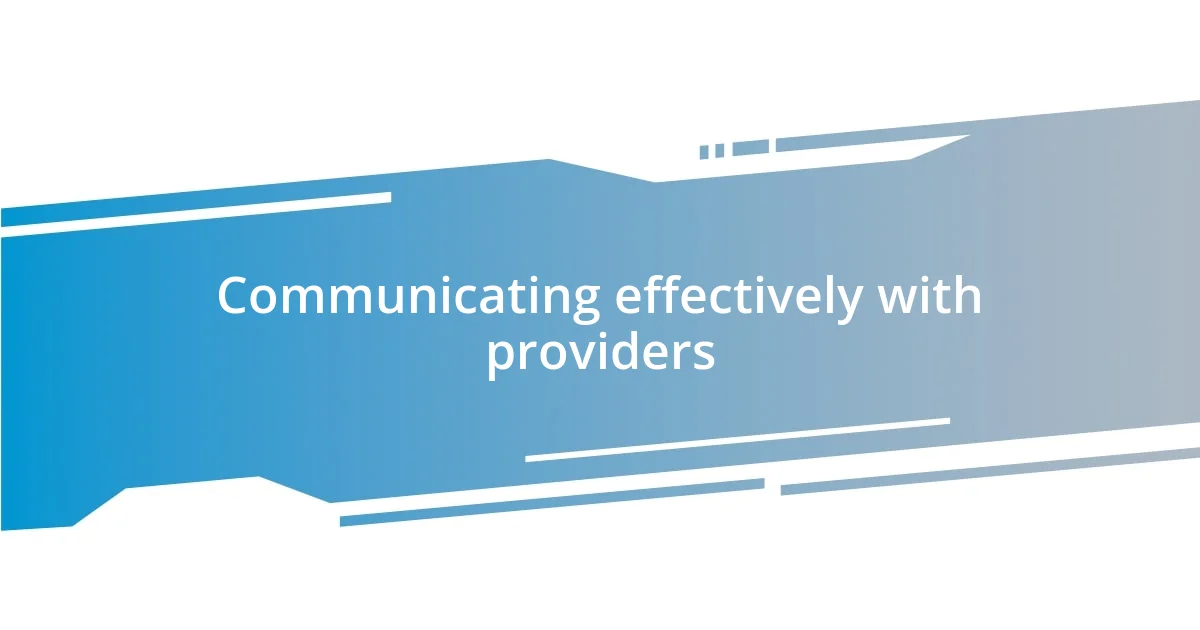
Communicating effectively with providers
Effective communication with healthcare providers is crucial for those of us navigating the complexities of disabilities. In my experience, I’ve found that being open and honest about my symptoms and how they impact my daily life leads to more productive conversations. For instance, I once explained how fatigue made it challenging to complete my therapy exercises, and that prompt led my therapist to adapt my treatment plan. It’s like opening a door that leads to tailored care.
One technique that has served me well is to prepare specific questions before appointments. I’ve learned to jot down my concerns beforehand, which helps me stay focused and ensures I don’t forget any points during the visit. Have you ever left a provider’s office and realized you forgot to mention something important? That used to happen to me all the time! Now, I bring my notes along, and it’s a game-changer. Not only does it demonstrate my engagement, but it also encourages the provider to take my input seriously.
Additionally, ensuring clear communication means I need to advocate for myself effectively. It’s important to express when something doesn’t sit right with me—whether it’s a diagnosis or a prescribed treatment—as I’ve discovered that hesitation often leads to misunderstanding. Once, I pressed a physician when their explanations felt vague; it turned out that my intuition was spot-on. They extended the conversation further, leading to insights I had not previously considered and ultimately improving my care. Embracing that assertiveness has truly empowered my healthcare journey.
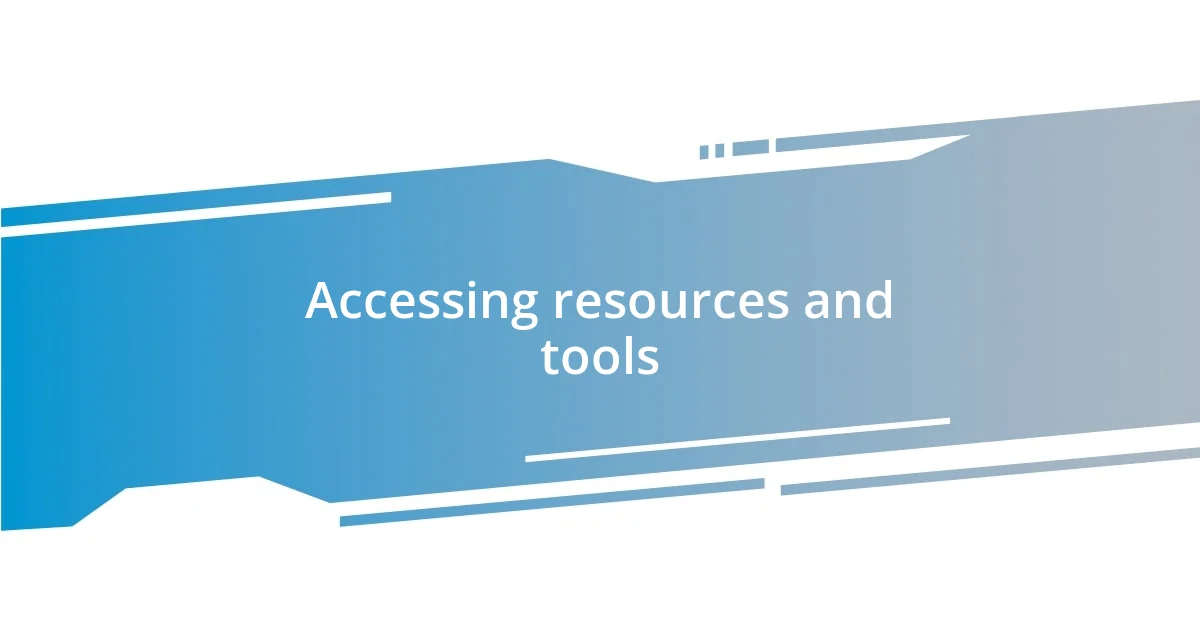
Accessing resources and tools
Accessing resources and tools can sometimes feel overwhelming, but I’ve discovered several strategies that have been incredibly helpful. For instance, when I first learned about disability-friendly apps, my life changed. I utilize tools like medication reminders and symptom trackers, which has made managing my health less chaotic. Have you ever tried a resource that seemed simple but transformed your routine? It’s fascinating how a small tool can provide such profound support.
Another essential resource I rely on is the power of local organizations. I remember attending a workshop hosted by a community health center, where they provided valuable information on tailored health resources for individuals with disabilities. Not only did I gain insights into financial assistance programs, but I also formed connections with representatives who were genuinely invested in helping navigate these opportunities. If you ever had the chance to sit down with someone who understood your needs, you’d likely feel that same spark of hope.
Lastly, don’t underestimate the Internet as a resource hub. One rainy afternoon, I stumbled upon a website dedicated to disability advocacy, filled with articles and forums that addressed everything from accessible transportation to mental health support. In those moments, I felt a rush of gratitude realizing how these digital spaces allowed me to seek information and share my experiences with others. Have you ever found yourself endlessly scrolling through forums and suddenly felt a sense of purpose in your journey? I know I have, and it reinforces that we’re all in this together.
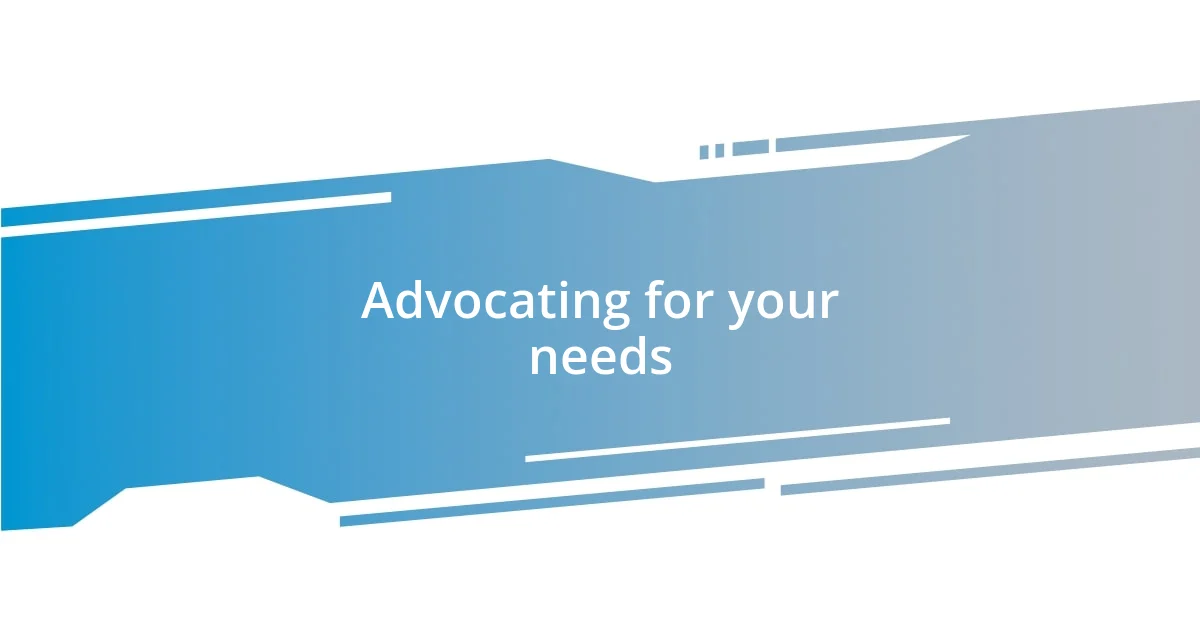
Advocating for your needs
Advocating for my needs in healthcare has been a transformative experience for me. I vividly recall a time when I expressed my discomfort with a specific medication. Most of us would shy away from challenging a doctor’s recommendation, right? But when I voiced my concerns, it led to a deeper discussion about alternatives that worked better for my body. That moment reinforced how essential it is to trust my instincts and articulate my needs. It’s about taking charge of my health journey rather than feeling like a passive bystander.
Sometimes, advocating for myself means reminding providers of the unique challenges I face as a disabled person. During a follow-up visit, I mentioned how my mobility limitations made it difficult to follow their suggested exercise routine. The provider’s face lit up with understanding, leading them to customize my plan to include more accessible options. Have you ever witnessed a moment where one honest comment sparked a wave of better understanding? I certainly have, and it emphasizes the power of open dialogue.
Lastly, I’ve learned the importance of surrounding myself with a support network. When I attended a local support group, I realized that others shared similar struggles, and voicing our experiences felt liberating. It’s like we create a safety net for one another—rallying together to ensure our needs are heard and respected. Isn’t it comforting to know you’re not alone in this journey? In those moments, advocating for my needs felt less daunting because I had a community backing me up, reinforcing my ability to speak out fearlessly.














